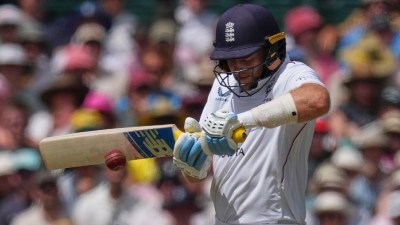When Didgeridoo met the Dholak
Mark Atkins,a world-renowned didgeridoo player,who opened the OZ fest in Delhi,delivered an impressive performance at the ongoing Jodhpur RIFF.
Mark Atkins,a world-renowned didgeridoo player,who opened the OZ fest in Delhi,delivered an impressive performance at the ongoing Jodhpur RIFF.
A pulsating drone created by way of an instrument called the didgeridoo enveloped the Zenana Courtyard at the majestic Mehrangarh Fort on Saturday evening. Mark Atkins,the famous Australian aboriginal didgeridoo player,had begun to breathe life into a long wooden trumpet and the mother of all flutes didgeridoo also known to most of the world as the revered emblem of Australian cultural tourism it has been a significant part of Australian aboriginal ceremonies.
As Atkins,a one-man-band,shuttled between didgeridoo,guitar and the vocals,while telling us stories of times gone by,he used various breathing techniques to create an aural kaleidoscope. The audience sat dumbfounded,trying to absorb the strange drones. Its practice. You just try and layer various characters along with the basic resonating tune, said Atkins,adding that he draws inspiration from things around him. A legendary didgeridoo player,he has collaborated with renowned American composer Phillip Glass,Robert Plant and Jimmy Page of Led Zeppelin and London Philharmonic Orchestra,among others,in the past.
Atkins performance catapulted the festivals standard manifold,the seventh edition of which otherwise had a slow yet serene start on Friday. There were unmistakable murmurs about Mick Jagger,the Rolling Stones front man who is the international patron of the festival,being present,but the man hasnt been spotted at the fort yet.
It was after a performance by Meghwals of Mewar and Sugna Devi Kalbeliya on Saturday that Atkins had come on stage. While the Meghwals sang a range of nirgun bhajans from Vedic traditions along with their tanduras at the Jaswant Thada,the royal burial ground and a perfect standpoint overlooking the blue city,Kalbeliya,one of the few Kalbeliya singers left in the country,wooed the audience with her throaty vocals at Shringar Chowk. The festival had opened on Friday with performances by a range of folk musicians near the city clock tower.
As for Atkins,his solemn opening strains brought an age-old music playing style to the fore,creating multi-layered echoes. There were animals,a fire,wind and a host of stories all layered together. Didgeridoo comes from the word wonga,which means extension of the breath, noted the 65-year-old.
For a teenager growing up in Western Australia in the 60s,it wasnt easy for him to be a musician. As a half aboriginal,with his mother being a Yamitiji aboriginals from Western Australia and father an Irish,he was one of the indigenous people for whom electoral representation had still not happened and most of them had lost their lands and lived on the fringes of non-Indigenous society. So music became a natural escape. Growing up in households where half the family was white and the other half black was difficult and interesting. While the white side was more materialistic,my mothers side was all about we and us. I was always living on the fence and this duality inspired me. I would walk into a bar to ask for a job,land up with it,and then told to leave after the rest of my black bandmates walked in, said Atkins,hours after his performance as he guzzled beer at regular intervals. Officially,you had to have politically correct songs in your playlist. We could not sing and play music about anything and everything, he recalled.
However,when in Jodhpur,he took the opportunity of collaborating with a host of Rajasthani percussionists on dholak,khartaal,moorchang and bhapang. While he juggled between his guitar and various types of didgeridoos,the men in colourful turbans played along,as the walls of the fortress throbbed with dramatic and dynamic moods.
- 01
- 02
- 03
- 04
- 05































